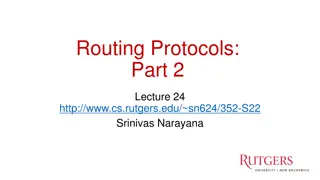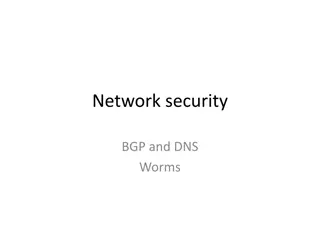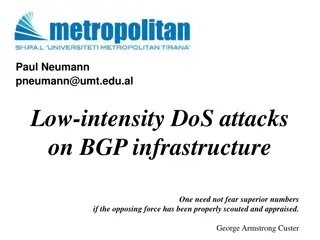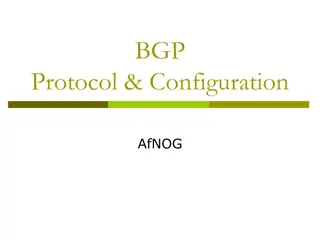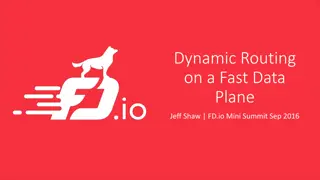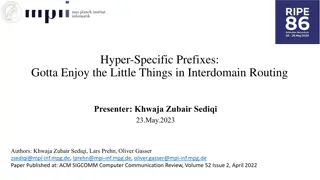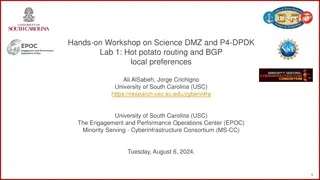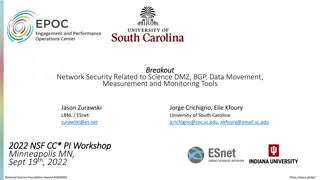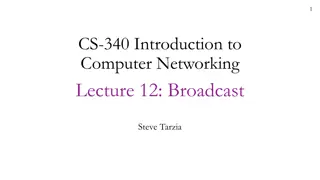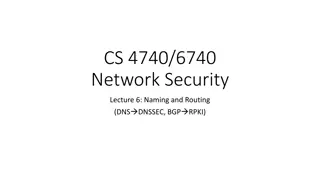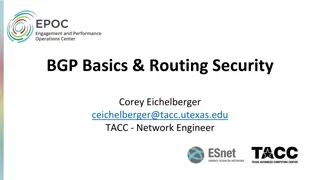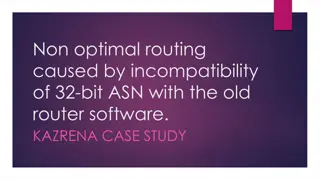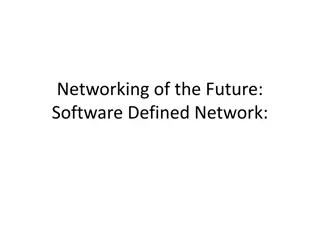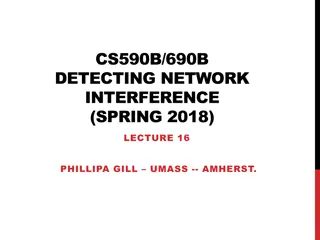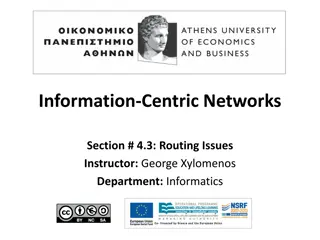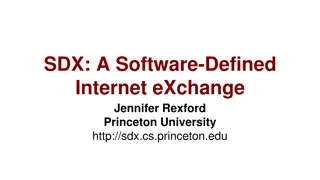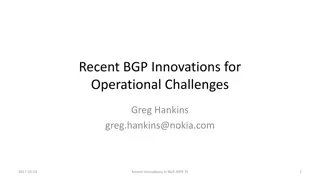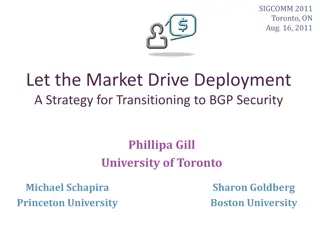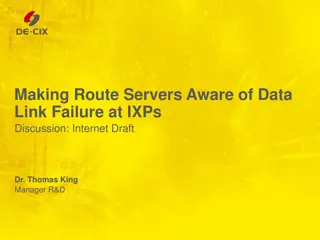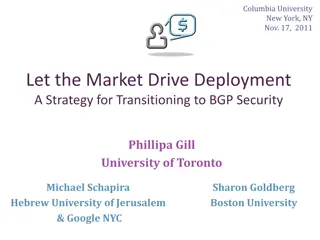Understanding Internet Routing Protocols
Explore the intricacies of routing protocols in the context of the Internet's large federated network. Delve into the concepts of reachability, message exchange, algorithm design, and the challenges posed by running an autonomous system. Gain insights into the Border Gateway Protocol (BGP) and inter
1 views • 26 slides
Understanding BGP and DNS Worms in Network Security
Border Gateway Protocol (BGP) is crucial for network communication, allowing autonomous systems to exchange routing information. BGP works by announcing network ownership and directing traffic efficiently. However, BGP Blackhole attacks pose a threat, where malicious entities reroute traffic to disr
0 views • 37 slides
Understanding Low-Intensity DoS Attacks on BGP Infrastructure
Low-intensity Denial of Service (DoS) attacks present a new challenge in cyber warfare, blending in with regular traffic to target communication channels like HTTP, SMTP, and DNS. These attacks require multiple participating hosts to flood the target with useless packets, gradually overloading serve
0 views • 25 slides
Understanding BGP Protocol and Configuration for Routing Policy Filtering
Explore the terminology, reasons, and methods behind routing policy filtering in the context of BGP protocol configuration. Learn how to control traffic routing preferences, filter routes based on AS or prefix, and use regular expressions for complex filtering rules. Discover the importance of AS-Pa
0 views • 29 slides
Understanding Dynamic Routing on Fast Data Plane with VPP and BIRD
Explore the concept of dynamic routing on a fast data plane featuring VPP (Vector Packet Processing) and BIRD (Internet Routing Daemon). Learn how packets traverse a graph, routing mechanisms like BGP, RIP, OSPF, and how sockets and plugins interact to forward traffic efficiently. Discover how VPP a
0 views • 12 slides
Comprehensive Course Review: Security Research Cornerstones at Carnegie Mellon University
Dive into the essential topics of software security, network security, OS security, and cryptography in the course offered by Vyas Sekar at Carnegie Mellon University. Explore control flow hijacks, cryptography terminology, and the importance of network security in protecting data transmissions. Lea
0 views • 41 slides
Understanding Hyper-Specific Prefixes in Internet Routing
Delve into the world of Hyper-Specific Prefixes (HSPs) in Internet routing as authors analyze the prevalence, visibility, and consistency of these unique routing elements. Exploring BGP best practices, related work, and methodological approaches, the study uncovers the nuances of HSPs' presence and
0 views • 31 slides
Understanding TCP Round-Trip Time Measurement
This presentation delves into the importance of measuring TCP round-trip time in the data plane, highlighting key reasons such as security against BGP hijacks and IP spoofing, performance enhancements, and improving user Quality of Experience. It explores monitoring at a vantage point, TCP sequence
0 views • 12 slides
Hands-On Workshop on Science DMZ and P4-DPDK Lab
Join the workshop at the University of South Carolina to learn about hot potato routing, BGP local preferences, and hands-on lab activities focusing on network topologies and configurations. Explore the Lab Topology, Lab Configuration, and Platform Information for an interactive learning experience
0 views • 6 slides
Network Security Breakout: Science DMZ, BGP, Data Movement, Measurement & Monitoring Tools
Delve into network security topics related to Science DMZ, BGP, data movement, and measurement tools discussed at the NSF CC* PI Workshop. Key speakers include Jason Zurawski from LBNL and representatives from the University of South Carolina. The workshop covers various aspects of network security
0 views • 13 slides
Understanding Computer Networking: Broadcast and Multicast Protocols
In this lecture on computer networking, we explore the concepts of broadcast and multicast protocols. The discussion covers topics such as BGP routing, IPv4 anycast hack, IP multicast, and the role of broadcast in small-to-moderate sized ad hoc networks. Learn about the differences between unicast,
0 views • 20 slides
Securing Domain Control with BGP Attacks and Digital Certificates
Exploring the vulnerabilities of domain control verification in the context of BGP attacks and the role of digital certificates in ensuring security. The process of domain control verification, issuance of digital certificates by Certificate Authorities (CAs), and the significance of Public Key Infr
0 views • 53 slides
Evolution of BGP: Expectations vs. Reality in Protocol Development
BGP has evolved over 30 years from its origins as an advancement of EGP in the 1980s to address issues like routing explosion, IPv6 integration, and imperfections such as session insecurity and protocol instability. Despite challenges, BGP remains a critical component of inter-domain routing, adapti
0 views • 10 slides
Understanding Network Security Fundamentals
Explore the critical components of network security focusing on DNS, BGP, and RPKI. Learn about the importance of trust on the Internet, potential attacks, and measures to secure DNS and BGP protocols. Delve into naming hierarchy, DNS structure, hierarchical administration, and DNS server functions.
0 views • 70 slides
Understanding BGP Basics and Routing Security
Border Gateway Protocol (BGP) is a crucial protocol used by routers to exchange routing information and make routing decisions. This protocol plays a key role in how the Internet functions, with over 76,000 Autonomous Systems and millions of routes being advertised. Research and Education (R&E) netw
0 views • 33 slides
Understanding Non-Optimal Routing and 32-Bit ASN Compatibility
Explore the challenges caused by the incompatibility of 32-bit ASN with old router software, leading to non-optimal routing issues. Learn about Autonomous Systems, AS Numbers, BGP asymmetric routing, and the importance of routing software supporting 32-bit ASN. Discover how outdated software replace
0 views • 8 slides
Evolution of Networking: Embracing Software-Defined Networks
Embrace the future of networking by transitioning to Software-Defined Networks (SDN), overcoming drawbacks of current paradigms. Explore SDN's motivation, OpenFlow API, challenges, and use-cases. Compare the complexities of today's distributed, error-prone networks with the simplicity and efficiency
0 views • 36 slides
Understanding Network Interference in CS590B/690B Lecture
Delve into the realm of network interference through the CS590B/690B lecture with Phillipa Gill at UMass Amherst. Explore topics such as Internet routing, timing attacks, BGP hijacks, Tor network functionality, relay selection, collusion scenarios, use of guards, web site fingerprinting attacks, tra
0 views • 11 slides
Understanding Routing Issues in Information-Centric Networks
This section delves into the routing issues within Information-Centric Networks, highlighting vulnerabilities such as misconfigured routers, prefix hijacking, and impersonation. It emphasizes the importance of validating routes and proposes improvements to address security concerns associated with B
0 views • 15 slides
Revolutionizing Networking with Software-Defined Innovations
Discover how Software-Defined Networking (SDN) and Internet Exchange technologies are transforming network infrastructure design, management, and interdomain traffic delivery. Explore the limitations of traditional routing protocols like BGP and the valuable wide-area services enabled by SDN, offeri
0 views • 27 slides
Recent BGP Innovations for Operational Challenges
Increased operator participation in standardizing solutions for BGP operational challenges, with new innovations such as destination-based blackholing and secure EBGP policy defaults. The presentation outlines recent advancements in BGP to enhance network performance and security, emphasizing collab
0 views • 49 slides
Transitioning to BGP Security: Incentives and Challenges
Explore the strategies and incentives for transitioning to BGP security in internet routing, including the use of S*BGP to attract traffic and mitigate interception attacks. Learn about RPKI as a key infrastructure and the need for additional security measures beyond RPKI. Discover how S*BGP can hel
0 views • 31 slides
Ensuring Route Server Resilience in IXPs Against Data Link Failures
Discussion on the Internet Draft by Dr. Thomas King and team regarding making route servers aware of data link failures at Internet Exchange Points (IXPs). The draft addresses challenges, typical scenarios, and provides solutions utilizing mechanisms such as Bidirectional Forwarding Detection (BFD)
0 views • 11 slides
Market-Driven Deployment Strategy for BGP Security
Incentives for enhancing BGP security are explored in this study, highlighting challenges and solutions for deployment. The importance of ISPs embracing S-BGP for financial gains and security benefits is emphasized. An outline of the strategy, model simulations, and practical recommendations are pro
0 views • 44 slides
